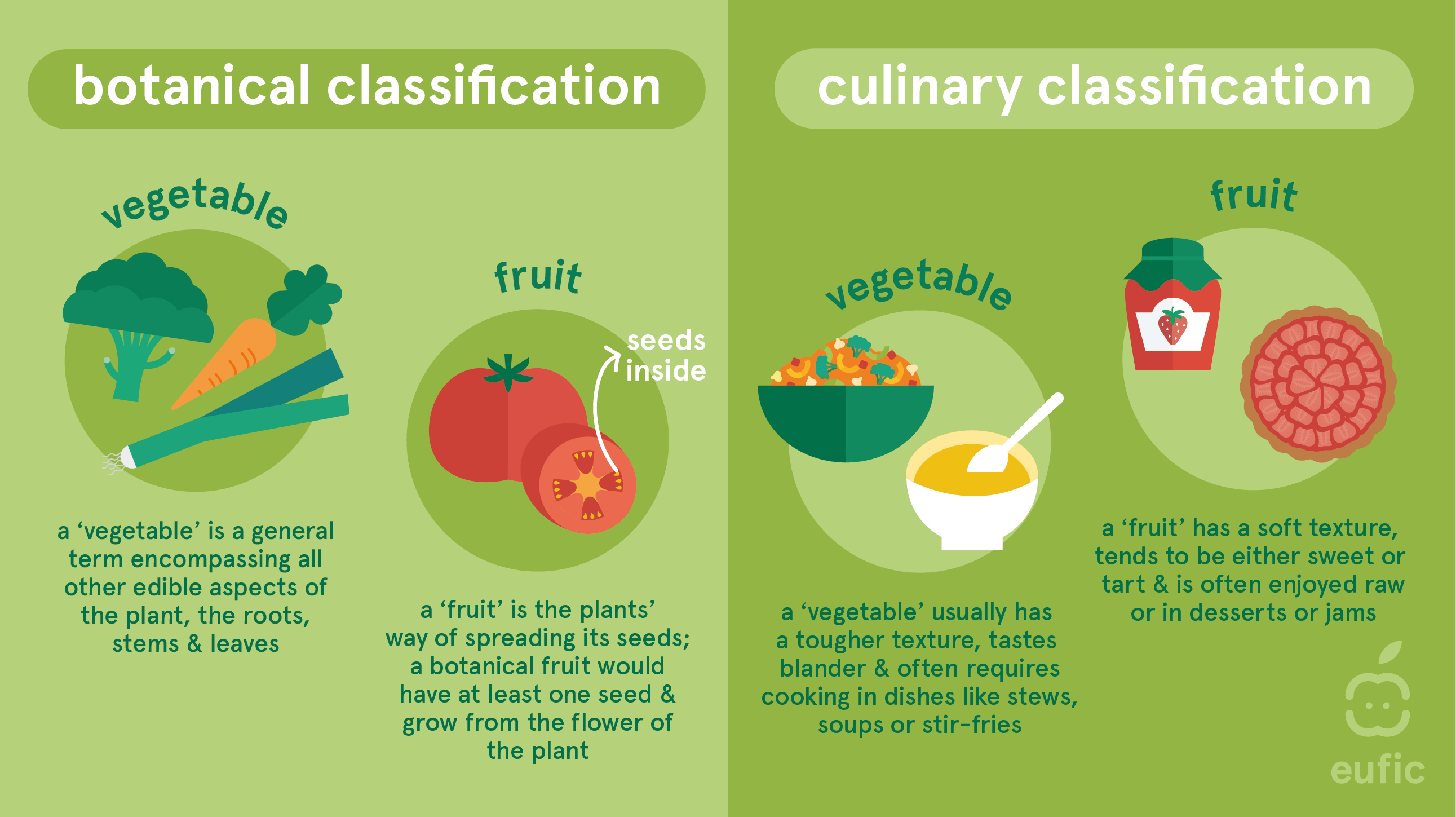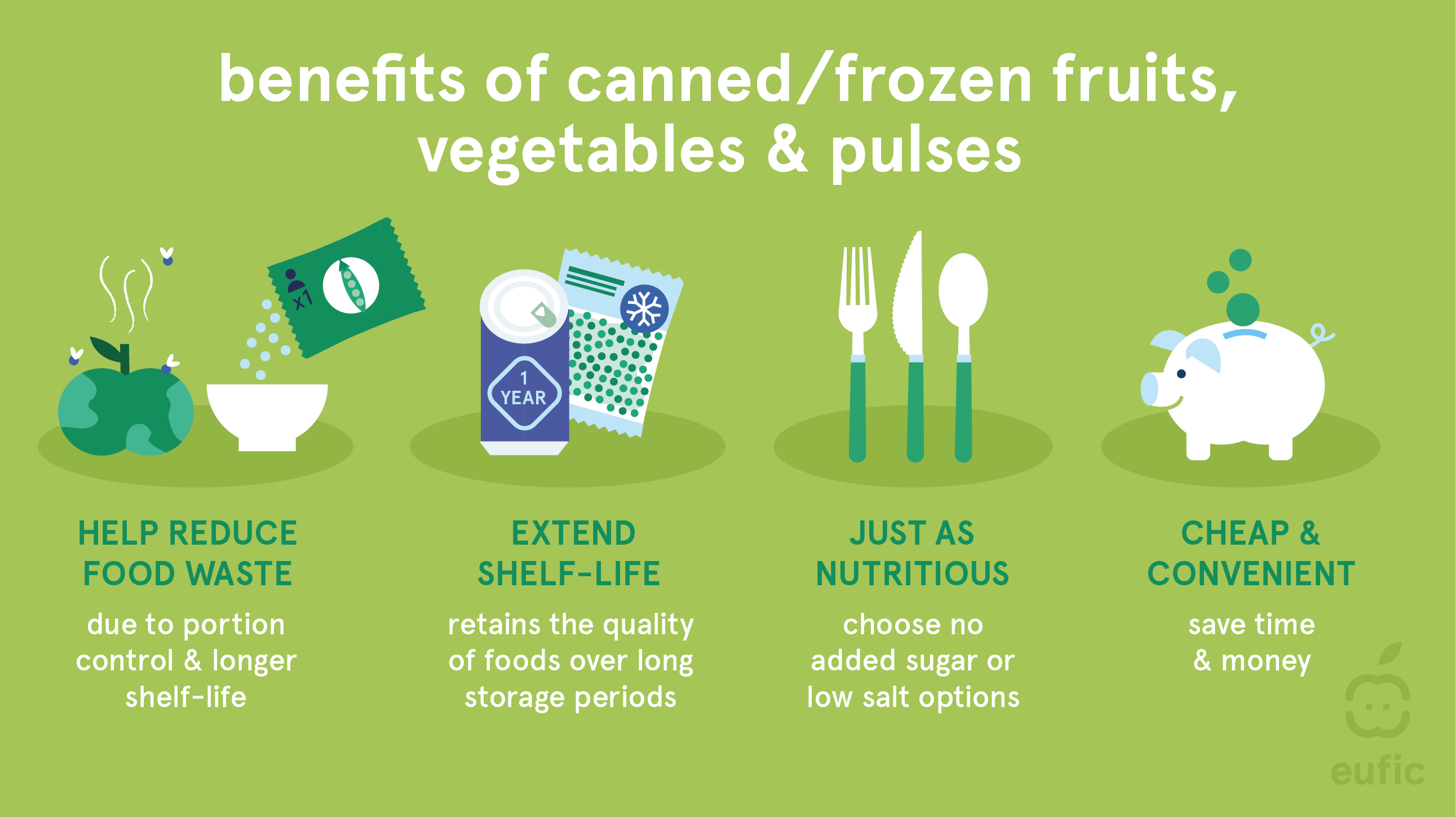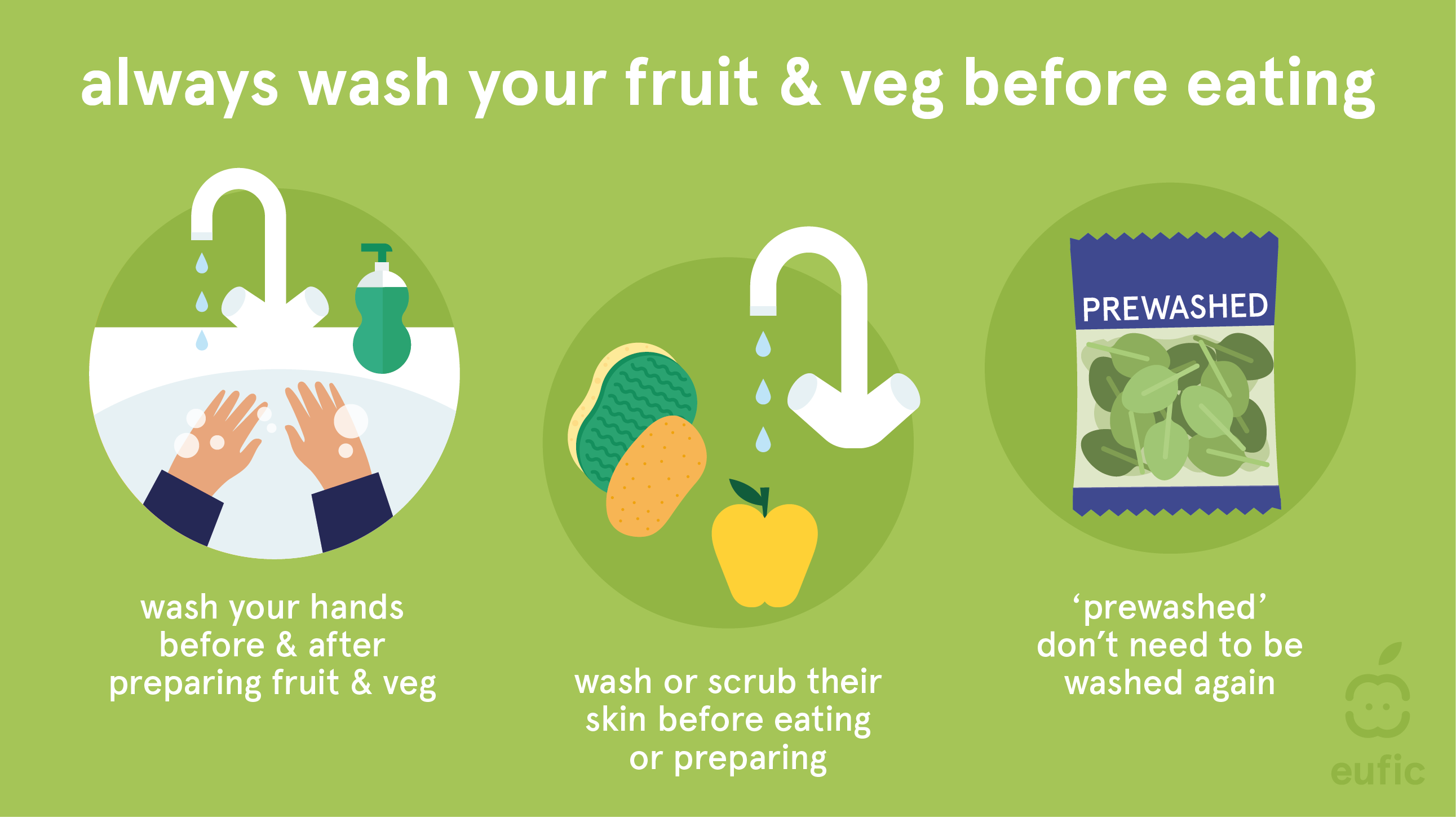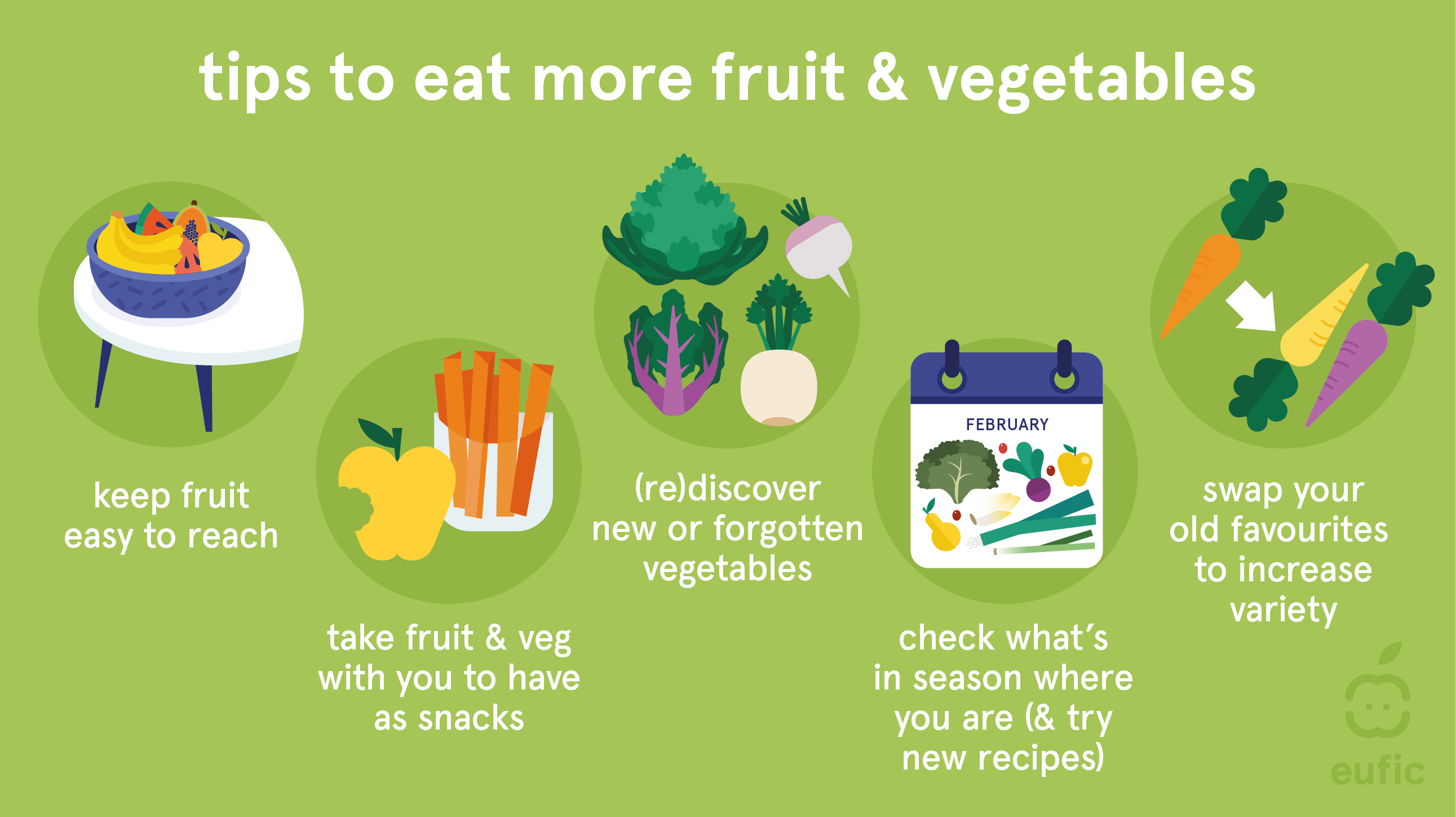The benefits of fruits and vegetables
Last Updated : 24 July 2023Fruits and vegetables are an essential part of a healthy diet. Not only do these colourful foods add flavour and variety to your meals, but they also pack a powerful nutritional punch, providing vitamins, minerals, fibre and antioxidants. In this article, we will explore the health benefits of eating fruits and vegetables, how much and the best types to eat and answer some commonly asked questions about fruits.
What is the difference between fruits and vegetables?
Fruits and vegetables are classified from both a botanical and culinary standpoint. The botanical classification is based on the plant’s physiological characteristics, like its structure, function and organisation.1 A botanical fruit has at least one seed and grows from the flower of the plant. Examples of botanical fruits include apples, strawberries, peaches, but also tomatoes, cucumbers and peppers. A botanical vegetable, on the other hand, does not have a set definition but is more of a general term encompassing all other edible aspects of the plant, the roots, the stems and the leaves. Examples include foods such as spinach, broccoli and carrots.
The culinary classification is based on the way the plants are used and their flavour profiles. Culinary fruits have a softer texture, tend to be either sweet or tart and are often enjoyed raw or in desserts or jams. In contrast, a culinary vegetable usually has a tougher texture, blander taste and often requires cooking. The culinary classification may be more useful in our day-to-day lives as foods from the same botanical family may not have the same nutritional composition. For example, cantaloupe melons, watermelons, butternut squash, cucumbers and pumpkins all belong to the same botanical family but have different nutritional values.

What are the health benefits of fruits and vegetables?
Most people know that fruits and vegetables are good for us. Both fruits and vegetables are high in dietary fibre as well as vitamins and minerals, and other bioactive plant compounds, including many with antioxidant properties such as polyphenols or beta-carotene. Fruits and vegetables contain, for example, vitamin A, B5, folate, C, E & K and are a rich source of calcium, iron, magnesium, manganese and potassium.2 The amounts and types of nutrients vary between different types of fruits and vegetables. Fruits and vegetables are also high in water, ranging from 75-90% of their weight. This fact explains their low energy content. Fruits and vegetables usually contain traces of fats and protein, with a few exceptions such as avocados, which have a high fat content. There is no evidence that organic fruits and vegetables are more nutritious compared to conventional varieties.3-5
Eating a lot of fruits and vegetables is strongly associated with a lower risk of premature deaths and non-communicable diseases; particularly, cardiovascular diseases, such as coronary heart disease and stroke, and certain cancers i.e., of the mouth, pharynx, larynx, oesophagus and colorectum.6-8 A meta-analysis looking at 95 prospective studies found that each additional 200 grams of fruits and vegetables per day was associated with an 8% lower risk of coronary heart disease, 16% lower risk of stroke, 8% lower risk of cardiovascular disease, 3% lower risk of cancer and 10% lower risk of premature death.9 Eating fruits and vegetables was associated with these reduced risks up to intakes of 800 grams per day except cancer, where no further reductions in risk were observed above 600 grams per day.
Eating fruits and vegetables is also linked to a lower risk of other diseases, including dementia, certain eye diseases, rheumatoid arthritis, osteoporosis, asthma, chronic obstructive pulmonary disease, depression, pancreatic diseases and hip fractures, although with a lower strength of evidence.6,7 Furthermore, diets high in fruits and vegetables may prevent weight gain, the most important risk factor for type 2 diabetes.
How much fruit and vegetables should I eat per day?
The World Health Organisation (WHO) recommends eating at least 400 g of fruits and vegetables per day.10 This is often translated to five 80 g portions (also commonly known as “5-a-day”). Almost all fruits and vegetables count towards this recommended daily amount, with a few exceptions: potatoes and other starchy tubers such as cassava; tinned or canned fruits and vegetables with added sugar or salt; more than one portion of dried fruit (30 grams); and more than 150 ml of 100% fruit or vegetable juice or smoothie. In other words, dried fruit and fruit/vegetable juices and smoothies only count for one of your 5-a-day even if you eat or drink more portions.
Should I avoid eating fruits and vegetables because of ‘anti-nutrients’?
No, fruits and vegetables are healthy choices, despite containing anti-nutrients.
Anti-nutrients are chemicals that are found in plant-based foods that can interfere with how your body absorbs nutrients.11 Examples of anti-nutrients found in fruits and vegetables include lectins (e.g., in tomatoes and aubergines), oxalates (e.g., in spinach, Swiss chard and beetroot), goitrogens (e.g., in kale, Brussels sprouts, cabbage and broccoli) and tannins (e.g., in grapes, berries, apples and stone fruits).12 Other examples of anti-nutrients you may have heard of include phytates (e.g., in legumes, whole grains and nuts and seeds) and phytoestrogens (e.g., in soy and soy products and flaxseeds) but these two groups are not found in significant quantities in fruit and vegetables. Although evidence is limited, some suggested implications of these anti-nutrients include altered gut function and inflammation (lectins), reduced absorption of calcium (oxalates), and iron (tannins) and reduced absorption of iodine, hypothyroidism and/or goitre (goitrogens).12
Some studies have shown that anti-nutrients may cause negative health effects when eaten in very high amounts, without any form of food processing, or in isolated form (e.g. not as part of a food). However, often the health effects seen in these studies are not easily comparable to potential effects of eating them as part of our every diet. For example, much of the research on anti-nutrients linking them to negative health outcomes is performed in animals, which cannot tell us what happens in humans.12 Moreover, how our bodies absorb nutrients from our diets likely significantly different that how it reacts to isolated compounds used in some research studies. This is because the diverse and complex interactions of all the chemicals in our foods and food combinations affect how our body digests and absorbs nutrients, and any resulting health effects.11,12
There is however consistent evidence showing that a eating a lot of fruits and vegetables is linked to a reduced risk of various diseases. So, although fruits and vegetables contain anti-nutrients, the health benefits of eating them outweighs any potential negative nutritional effects. Food processing techniques such as boiling, steaming or peeling the skins (specifically for fruits high in tannins) can also reduce the amount of anti-nutrients present in fruits and vegetables.
In a small number of people who have or are at high risk for certain illnesses, anti-nutrients might cause problems (e.g., oxalates in kidney stone formation and goitrogens in thyroid disease).12 In this case, it is best to consult with a registered dietitian or GP for individualised and safe advice.
What fruit or vegetable is best for health?
No single fruit or vegetable is best for health. All fruits and vegetables are good for health and provide different nutrients. Eating a variety of types and colours provides us with a range of different nutrients the body needs.
Some studies have found that specific fruits and vegetables may be more strongly related to reducing our disease risk.9 These include apples and pears, citrus fruits, green leafy vegetables (e.g., kale, spinach and pak choi) and salads and cruciferous vegetables (e.g., broccoli, Brussels sprouts and cabbage) for cardiovascular disease and mortality and green-yellow vegetables and cruciferous vegetables for total cancer risk.
Are fresh fruits and vegetables better than frozen?
Both fresh and frozen fruits and vegetables are nutritious choices and count towards the recommended daily intake. Generally, produce picked at peak ripeness offers the highest amount of vitamins and minerals. During sorting, transporting and distribution, fruits and vegetables lose some of their vitamins and minerals. Frozen fruits and vegetables are often frozen within a few hours of harvesting at peak ripeness, and so they retain the most nutrients. However, some vegetables are blanched before freezing, which reduces the levels of less stable water-soluble vitamins, such as vitamins B1 and C, as well as antioxidants.13 Other nutrients such as fat-soluble vitamins A and E are less easily lost, and processing may make these even more available to our bodies.14
Frozen fruits and vegetables are convenient, often cheaper than fresh and allow us greater variety year-round. They can help to reduce food waste. When choosing frozen produce, choose ones that don’t have added salt or sugar.

When should you eat fruits? Can you eat fruits at night?
Fruits are a healthy choice at any time of the day. The myth that eating fruits at night is bad for you stems from the idea that eating fruit will raise your blood glucose levels and that if your body does not have time to stabilise those levels before bed, it may lead to weight gain. However, there is no evidence to suggest that eating fruit at night is harmful or leads to weight gain.
Any carbohydrate-containing food, including fruits but also vegetables, bread, pasta and pulses, will temporarily increase your blood sugar while glucose is being absorbed by the body, regardless of the time of day. Some studies indicate that our body’s glucose control is influenced by our internal body clock and that eating carbohydrates earlier in the day is associated with better glucose control.15 However only a small number of studies have looked at this so far and more studies are needed to understand the mechanisms and whether there is any impact on health.
Importantly, glucose control is also dependent on a person’s overall diet and the amount and type of carbohydrate consumed. For example, pairing fruit with a source of protein or fat can help slow down the absorption of sugar and mitigate any potential spikes in blood sugar levels. It’s also important to consider overall calorie intake, as consuming excessive calories from any source can lead to weight gain over time.
Is sugar in fruit bad for you?
No, sugar in fruit is not bad for you. Foods in which sugars naturally occur, such as fruit, vegetables, grains or pulses, usually also contain fibre and other health-promoting nutrients, such as vitamins and minerals. As such they are better for our health than foods containing predominantly free or added sugars and few other nutrients. Indeed, high intake of free and added sugars is a risk factor for many preventable diseases,16,17 whereas overall, high fruit and vegetable intake is associated with a lower risk of cardiovascular diseases, cancers and premature death.9
How to safely handle fruits and vegetables?
Since they are often eaten raw, fresh fruit and vegetables can sometimes be a source of foodborne illness. This is because they can pick up microbes from manure or water used during production, or at other stages of picking, storage and transport. However, basic food hygiene can reduce this risk so we can enjoy a wide variety of fresh fruits and vegetables:
- Wash your hands before and after preparing fruits and vegetables;
- Wash or scrub their skin with water before eating or preparing (products marketed as fruit and vegetable washes are not necessary);
- ‘prewashed’ fruits and vegetables don’t need to be washed again;
- Store them properly and throw away produce that looks or smells spoiled

Summary
Fruits and vegetables are an essential part of a healthy diet. They are rich in nutrients and can lower our risk of chronic diseases such as cardiovascular diseases and certain cancers. Eating a variety of fruits and vegetables will help ensure that you are getting a range of nutrients. Whether you choose fresh or frozen or eat them in the morning or at night, fruits and vegetables are a great way to boost your health. Eating 400 g of fruits and vegetables a day may seem ambitious but here are some helpful tips to help you:
- Keep fruit easy to reach;
- Take fruits and vegetables with you to have as snacks;
- (re)discover new or forgotten vegetables;
- Check what is in season where you are (& try new recipes);
- Swap your old favourites to increase variety.

References
- Pennington JAT & Fisher RA (2009). Classification of fruits and vegetables. Journal of Food Composition and Analysis 22S:S23-S31.
- Public Health England. 2019. McCance and Widdowson’s Composition of Foods Integrated Dataset.
- Dangour AD, Dodhia SK, Hayter A, Allen E, Lock K & Uauy R (2009). Nutritional quality of organic foods: a systematic review. American Journal Clinical Nutrition. 90:680-685.
- Bourn D & Prescott J (2002). A comparison of the nutritional value, sensory qualities, and food safety of organically and conventionally produced foods. Critical Reviews in Food Science and Nutrition 42:1-34.
- Worthington V (1998). Effect of agricultural methods on nutritional quality: A comparison of organic with conventional crops. Alternative Therapies in Health & Medicine 4:58-69.
- Angelino, D. et al. (2019). Fruit and vegetable consumption and health outcomes: An umbrella review of observational studies. International Journal of Food Sciences and Nutrition, 70(6), 652-667
- Boeing, H., Bechthold, A., Bub, A., Ellinger, S., Haller, D., Kroke, A., ... & Watzl, B. (2012). Critical review: vegetables and fruit in the prevention of chronic diseases. European journal of nutrition, 51, 637-663.
- World Cancer Research Fund International. (2018). Wholegrains, vegetables and fruit and the risk of cancer. Continuous Update Project Expert Report.
- Aune, D. et al. (2017). Fruit and vegetable intake and the risk of cardiovascular disease, total cancer and all-cause mortality—a systematic review and dose-response meta-ananalysis of prospective studies. International journal of epidemiology, 46(3)
- World Health Organization. (2020). Healthy diet. Retrieved from https://www.who.int/news-room/fact-sheets/detail/healthy-diet
- López-Moreno, M., Garcés-Rimón, M., & Miguel, M. (2022). Antinutrients: Lectins, goitrogens, phytates and oxalates, friends or foe?. Journal of Functional Foods, 89, 104938.
- Petroski, W., & Minich, D. M. (2020). Is there such a thing as “anti-nutrients”? A narrative review of perceived problematic plant compounds. Nutrients, 12(10), 2929.
- Rickman JC, Barrett DM & Bruhn CM. (2007). Nutritional comparison of fresh, frozen and canned fruits and vegetables. Part I. Vitamins C and B and phenolic compounds. Journal of the Science of Food and Agriculture 87:930-944.
- Rickman JC, Barrett DM & Bruhn CM. (2007). Nutritional comparison of fresh, frozen and canned fruits and vegetables. Part II. Vitamin A and carotenoids, vitamin E, minerals and fiber. Journal of the Science of Food and Agriculture 87:1185-1196.
- Zhao, L., Hutchison, A. T., & Heilbronn, L. K. (2021). Carbohydrate intake and circadian synchronicity in the regulation of glucose homeostasis. Current Opinion in Clinical Nutrition & Metabolic Care, 24(4), 342-348.
- Gakidou E, et al. (2017). Global, regional, and national comparative risk assessment of 84 behavioural, environmental and occupational, and metabolic risks or clusters of risks, 1990-2016: a systematic analysis for the Global Burden of Disease Study 2016
- Mann J (2007). Dietary carbohydrate: relationship to cardiovascular disease and disorders of carbohydrate metabolism. European Journal of Nutrition 61:S100-S111.